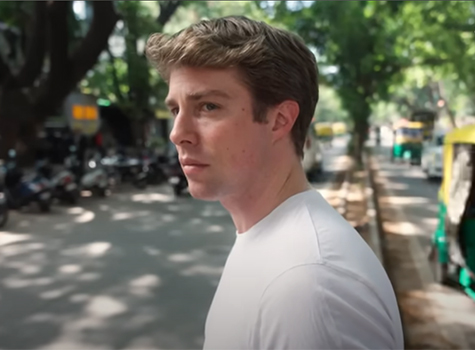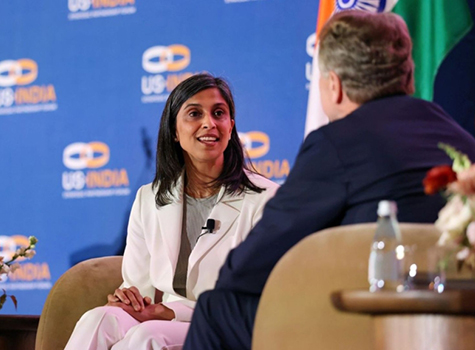By Samir Shukla

Amid the backdrop of the 125th anniversary of Swami Vivekananda’s historic speech in Chicago at the first World Parliament of Religions back in 1893, the delegates for World Hindu Congress gathered in the Chicago suburb of Lombard for three days with the theme of the principle “Sumantrite Suvikrante – think collectively, achieve valiantly.”
The second World Hindu Congress (WHC) was held September 7-9, 2018 at the Westin Hotel. It was organized by World Hindu Foundation with the basic premise, “the WHC 2018 seeks to encourage Hindus to ascend to the highest levels of the excellence in different fields.”
The WHC was promoted as a global platform to connect, share ideas, inspire and support one another, and impact the common good. There were seven parallel conferences held during the Congress: Economic, Education, Hindu Organizations and Temples Associations (HOTA), Media, Political, Women, and Youth.
Of course, Hinduism, arguably the world’s oldest religion, is uniquely diverse with no discernible beginning or specific person designated as the prime creator of the religion. The Vedic foundations of Hinduism have been in the air and soil of the Indian Subcontinent for millennia. Its stories and philosophy are pervasive all over the Subcontinent as well as Southeast Asia.
It’s a daunting task to work for unity of Hinduism, which is more a way of life and guide for daily living than a religion. India’s Prime Minister Narendra Modi is a longtime activist of Indian nationalism as defined by the Hindu traditions and heritage. He is often tagged as a Hindu nationalist.
Some gathered speakers and activists worked to dispel the notions that India is becoming a Hindu nationalist country while others argued India and Hinduism are one organism. Many speakers posited that outside and Western forces have spent centuries trying to define Hinduism while putting Hindus in linguistic and regional baskets.
One of the themes echoed throughout the gathering was that Hindus should gain control of their destinies and not bend to the whims of Western academia or activists and resuscitate India’s (or Bharat as all gathered referred to India) past glory and heritage and bring them into the present. Needless to say, it was a very pro-Modi crowd.
The WHC kicked off Thursday night with a cultural program featuring performances by violinist L. Subramaniam, singer Kavita Krishnamurti and classical dancer Pavithra Srinivasan.
The sold-out gathering, with over 2500 delegates, was attended by academicians, industrialists, businessmen, politicians, legislators, religious scholars, activists and media personalities representing 60 countries.
On the first day, several dignitaries helped launch the Congress, including actor Anupam Kher, while a larger than life statue of Swami Vivekananda watched over the plenary sessions.

Saying that it was a big achievement for a poor Kashmiri Hindu boy to be speaking at the event, Kher saluted “our country India…a place that has been home to all cultures, religions and faiths.”
Hinduism is a way of life, he added, and one becomes a Hindu by living like one. Tolerance was the centerpiece of Vivekananda’s message. He stated that despite being refugees in their own country, Kashmiri Pandits have practiced tolerance for 28 years like nobody ever has.
“My roots are steeped in Hinduism. I refuse to be defined by other people’s fears. My Hindu teachings and life’s experiences have taught me that there is time for peace and there is time for war. I use war as a metaphor; platforms like this from which I can speak to the world, remind me of my karmic duty. I draw inspiration from Swami Vivekananda to shine a light on all of us gathered here and beyond. As a Hindu, it pains me deeply to see how ignorance and half knowledge are trying to destroy one of the oldest, world’s most peaceful religion.”
U.S. Congressman Raja Krishnamoorthi (D-IL) also addressed the gathering saying he had received pushback for attending.
Krishnamoorthi said, “Some of my friends and constituents were very concerned about my presence here today. I decided I had to be here because I wanted to reaffirm the highest and only form of Hinduism that I’ve ever known and been taught – namely one that welcomes all people, embraces all people, accepts all people regardless of their faith, including all my constituents.”
“In short, I reaffirm the teachings of Swami Vivekananda. It is because of his legacy of equality and pluralism that I stand before you as a Hindu, as an American and a United States Congressman.”
“We must teach our children tolerance and love, diversity and inclusion which Hinduism embodies,” he added.
Tulsi Gabbard, the Democratic Congresswoman from Hawaii, was also supposed to attend the Congress but withdrew a few weeks back.
There were seven parallel conferences that took place over three days.
During the media conference, some speakers called for activist media entrepreneurs to not be driven by profits and make their writing contemporary and relevant to the present generation.
Interactive sessions at the different conferences presented personal remarks from speakers on panels followed by Q&A sessions, most were productive in the sense of offering or suggesting solutions for the progress and prosperity of Hindus as well as the betterment of humanity and the world.

Speakers at the Political Conference suggested the need for a permanent secretariat in the US or UK for the cause of Hindu rights around the globe, asserting a strong political voice around the globe while developing young political leaders.
Filmmakers Madhur Bhandarkar and Vivek Agnihotri spoke about representation of Hindus in films and TV in one of the sessions in the media conference.
One of the more intriguing speakers in the media conference was French writer and journalist Francois Gautier, whom Professor Makarand Paranjape (Director of Indian Institute of Advanced Studies in Shimla) teasingly introduced as the “most militant Hindu I know,” drawing laughter from the media conference crowd.
Gautier has been living in and writing about India for nearly five decades. His talk was direct, “You are the last knowledge. If Hinduism dies then the world will die.”
He was also unapologetic about his admiration for Modi. “You will not find another Modi for another hundred years. Hindus hold the truth; if you miss that opportunity then it is a shame.” He spoke of Indians leaving India to work abroad, “Greatest brain drain in the world is of Hindus. If kids know nothing about Vedic literature, etc, they are only good for export.”
Gautier was not shy about fighting back (as in Kashmir and Pakistan) and gave a battle cry, “You have the numbers, power, brains, money, education…but lost the power of the Kshatriyas (warriors).”
Throughout the different conferences I heard ideas and discussions with speakers as varied as Jagdishwar Goburdhan, Mauritius high Commissioner to India, and several Illinois politicians along with Lt. Governor of Illinois Evelyn Sanguinetti. Others who spoke were Vice-president of the Republic of Suriname Ashwin Adhin, entrepreneur and Grammy nominated artist Chandrika Tandon, renowned classical dancer Sonal Mansingh, and author Amish Tripathi of the Shiva Trilogy and Mohandas Pai chairperson of Board of Manipal Global.
The plight of Kashmiri Pandits was described as “refugees in our own country” by Dr. Sanjay Kaul. He spoke of 400,000 Kashmiri Pandits being forced out of the Kashmir valley around 1990, including his whole family, and how Kashmir was “Sanitized.”
Sanjesh Dhanja, a spokesman from Pakistan Hindu Seva Welfare Trust, spoke emotionally of the plight of Pakistani Hindus, whose numbers are dwindling.
Other subjects covered included, speaking out against biased portrayals of Hindus, freeing temples from government control, making writing contemporary and relevant for the younger generations, finding new ways to open trade and skills development, and organizing an Angel Investor group for women entrepreneurs.
Rashtriya Swayamsevak Sangh (RSS) (“National Patriotic Organization”) Chief Dr. Mohan Bhagwat, a keynote at the inaugural session, addressed the congress on the core theme drawn from the Mahabharat, “Think collectively, Act Valiantly.”
Bhagwat said, “We have stopped our descent and are contemplating how to ascend. Our universal values, now called Hindu values, lead to the welfare of the individual, the society, nature and the environment. It is the duty of Hindus to remind the world, the universal values from time to time. We want to make the world better. We have no aspiration of dominance. Our influence is not a result of conquest or colonization.”
Bhagwat and RSS in general evoke controversy in India and among secular circles as they are perceived as Hindu nationalists. It was a notion that many speakers downplayed, while goading attendees to be proud of their heritage and ancient history.
Among the many representatives and speakers of different religious organizations included Swami Poornatmananda of Bharat Seva Ashram, Chinmaya Mission Spiritual Head Swami Swaroopananda, Swami Paramatmananda, secretary general of Hindu Dharma Acharya Sabha, Satguru Dalip Singh of Namdari, and Madhu Pandit Dasa, chairperson of Akshaya Patra Foundation, ISKCON, Bangalore.
Messages by PM Narendra Modi, his Holiness the Dalai Lama, the Art of Living Guru Sri Sri Ravi Shankar, and BAPS Spiritual Guru Mahant Swami Maharaj were played via video. The Dalai Lama was scheduled to attend but couldn’t due to health reasons.
India’s Vice President Venkaiah Naidu, keynote for the concluding session, renewed Vivekananda’s message and elaborated on some of the essential elements of Hinduism namely the breadth of its vision in treating the world as one family, tolerance and acceptance of plurality, and unity in diversity. True nationalism is in the preservation of India’s invaluable heritage, he said.
WHC recognized four organizations for their contributions to spreading Hindu philosophy. The Bochasanwasi Aksharpurshottam Swaminrayan Sanstha (BAPS) was honored for its extreme visual idealism around the world as it built architecturally beautiful mandirs. Chinmaya Mission for explaining the essence of the Gita, Geeta Press, Gorakhpur for making sacred Hindu literature easily accessible, and the International Society for Krishna Consciousness for spreading the message of Gita were also honored.
One of the attendees, Col. Raj Bhalla said, “Being a Sikh, 87 years old, I always had a personal belief that Sikhs are part of Hindus. The World Hindu Congress further enlightened me and strengthened my conviction. My earnest desire is, in India, Sanskrit should be taught to children at a very young age so they learn about Vedic, Spiritual and Scientific knowledge that Hindus gave to the world 5000 years ago – a rightful matter of pride.”
The first WHC was held in New Delhi in 2014.
The organizers announced that the third World Hindu Conference will be held in Bangkok, Thailand, from November 4 – 6, 2022. The conference theme will be “Victory of dharma, not adharma.”
More details about WHC 2018 are available at, www.worldhinducongress.org.
———-
Samir Shukla is the editor of Saathee magazine. Contact – Samir@saathee.com



